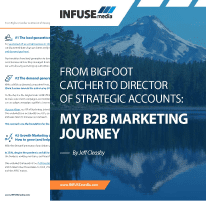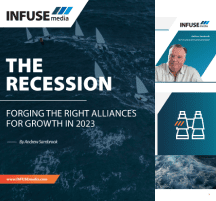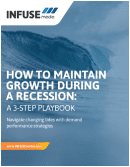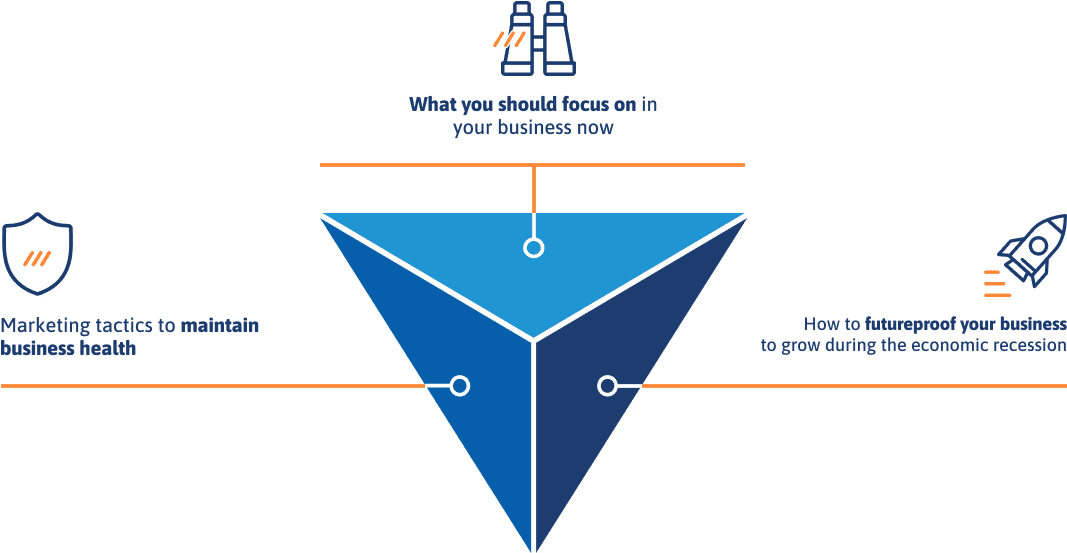How to Maintain Growth During A Recession: A 3-Step Playbook Navigate changing tides with demand performance strategies
IN THIS 3-STEP PLAYBOOK,
we explore a variety of techniques
for preparing your business for an economic recession:
Introduction
Trending news and thought pieces on the economy have always had the power to influence or direct business decisions. Indeed, from recent headlines alone, the layoffs within the technology sector in addition to tech and marketing budget cuts have left many feeling nervous. Whilst apprehension is understandable, focusing on this negativity is not constructive for your company and its future growth.
To help you empower your organisation, our demand experts have outlined key tactics in this 3-step playbook for tackling current and future challenges.
Since its initial publishing date in late 2022, this guide and playbook has been updated with new content and insights from our Voice of the Buyer & Voice of the Marketer Surveys to more accurately meet the challenges being faced this year and beyond.
This includes an entirely new section by CMO and GTM Leader, Scott Vaughan with 3 strategies for empowering your teams to future proof processes and yield success.
However, before we dive into the playbook itself, here is a brief overview of the economy in 2023:
What's happening
in 2023?
Events such as the COVID-19 pandemic, supply chain disruptions, and the War in Ukraine have contributed to this economic slowdown. Another clear indicator of this trend is the historical news of the Euro and Dollar parity for the first time in 20 years that occurred at the tail end of 2022.
Analysts, C-suites, and investors are uncertain about the economy this year and beyond. The tech, financial, and retail sectors seem to be a particular area of concern with layoffs being reported for Philips (8%), IBM (1.5%), Spotify (6%), and Google’s parent company Alphabet (6%), respectively. This is in addition to the 6% increase in job cuts in the U.S. reported in November 2022.
Despite these relatively bleak reports, multinational investment management and financial services company Morgan Stanley has stated that 'the recession today is likely to be shallower and less damaging to corporate earnings than recent downturns'.
In addition, analysts have stated that businesses will continue to increase spending on digital initiatives. For example, IT infrastructure and other software are likely to see a healthy growth of 5-6%. This was also reflected in results from our Voice of The Marketer and Voice of the Buyer Surveys that indicated that 53% of marketers will increase their budgets for tech spending with current tech priorities for 2023 being cloud (44%), security (40%), and data and analytics (28%).
Therefore, the key to prospering and reducing the impact of the recession on B2B businesses will be adequate preparation and the readjustment of strategies and budget allocation.
However, as far as marketing is concerned, it is always important to remember that the results from marketing campaigns starting now will only be seen in six months or possibly years later.
Therefore, marketing budgets should be maintained to enable growth. In doing so, you will be able to secure a competitive advantage when the economy returns to normal.
3-step playbook to tackle an economic recession
This B2B playbook breaks down strategies for your operations into three parts:
First,
identify the processes that are being overlooked at your company and that can no longer be ignored to guarantee operational efficiency during a recession.
Second,
demand tactics you should continue at your business to maintain a steady pipeline of leads to sales opportunities.
Third,
strategies you should implement to stimulate future business growth as you adapt to changing demands in the marketplace.
Sales and marketing alignment should always be a priority—the need for synchronising teams itself can be an indicator of issues that are holding you back. According to our Voice of the Marketer Survey, 52.4% of marketers face the obstacle of internal resource allocation and alignment between sales and marketing. If alignment has always been a goal on your agenda, now is the time to act upon it. Sales need to be heard and their concerns can shape your marketing and the direction of your business.
After all, the sales team is:

On the front line, getting feedback from leads on the value of your offerings. The most common objections by clients should inform how you market your brand moving forward and how you develop new products to meet emerging challenges.

Interacting with marketing-qualified leads (MQLs) and seeing success (or not) based on your criteria. Their feedback collected from interacting with leads will help you either refine your MQL qualification process or even revisit your Ideal Client Profile (ICP).
Empower your team to hold frequent meetings to field their input. Be sure to do this regularly, since ICPs and buyer personas can change frequently during an economic recession.
Provide sales with an enablement toolkit and continually update this asset to meet the changing needs of your leads. This is essential for the sales team to craft engaging outreach and is especially important for Account-Based Marketing (ABM). Avoid outdated content, and make sure to create new materials for sales to use in lead nurturing touches that speak to new pain points or needs.
Discover our VP of Strategic Accounts’, Jeff Cleasby, 4-chapter story in search of the perfect ICP and how to build your own

2. Nurture long-term clients
When budgets are cut, the temptation is to solely prioritise acquiring new clients to maintain cash flow. However, this is likely to lead to higher churn rates, particularly during a recession.
Even the most loyal of clients churn if they believe your solution does not meet their current needs. In fact, our Voice of the Buyer Survey showed that 47.8% of buyers will evaluate new vendors if their current ones are not meeting expectations. This is in direct correlation to recent changes in buyer behaviour due to increased financial pressures, budgetary scrutiny, and increased buyer education.
As a result, deploying personalised nurturing for these long-term relationships is more important than ever. Provide clients with valuable resources that showcase how to make the most of your products to fit their current needs and solve their new challenges.
Make your Client Success team readily available, and remind your clients that you are here to meet their needs and that you will stand by them. Maintaining a healthy relationship with clients is not only essential for retention but also helps to increase client lifetime value (CLTV) as you will have more opportunities to secure renewals and cross-sell opportunities.
3. Maintain pipeline and ad spend
Make sure your sales pipeline is healthy and prepped for growth. You want to make sure demand generation initiatives continue and are supported by omnichannel outreach to drive opportunities to sustain growth.
Demand generation in particular will be important in nurturing the full sales funnel and guiding leads through it with well-crafted nurturing activities. Our Voice of The Buyer Survey reported that 40% of buyers consume 4-6 pieces of content before a purchase, which highlights the importance of effective nurturing and personalisation. Although the value of demand generation activities may take longer to come into fruition, it is essential for maintaining a healthy sales pipeline and bringing in quality leads.
Indeed, rather than cutting demand budgets, now is the time to maintain or even increase your spend. Any limitations you set in terms of budget will have a detrimental effect on the number of new opportunities.
4. Reassess content and campaigns
Pause your campaigns and evaluate them to guarantee the relevance of their messaging. As frustrating as it may be, campaigns may quickly become irrelevant as the economy and buyer behaviour shift, so it is essential to take necessary adjustments.
When evaluating your campaigns and messaging, be sure to leverage intent and other segmentation data. A data-centric approach will aid in ensuring that your targeting, messaging, and content are accurate and effective for all members of the buying committee—30.5% of buyers have 4-6 people involved in the buying process (Voice of the Buyer Survey).
Assessing in this way will empower you to set up your content creation process with updated messaging tailored to relevant pain points, better positioning your brand and solutions.
Human-to-Human marketing (H2H) is a method of humanising your brand by making the people behind your business the main champion of your solutions.
Whilst this is not a new strategy or concept, recent challenges make communicating brand values and establishing real connections more important than ever, and therefore H2H is a must in the face of a recession (or frankly, any time a brand is communicating with its buyers).
By creating an emphasis on human interaction and relationships, your audience is more likely to associate key professionals with your products, which pairs well with thought leadership and employee branding.
HOW TO IMPLEMENT H2H AT YOUR BUSINESS:

Position your C-suite as
approachable thought leaders:
Go beyond regular thought leadership content, by establishing your business leaders as close allies of your clients. For example, have a director promote a case study in their own words (or publish their own content on LinkedIn addressing trends) rather than through regular corporate cadences.

Leverage Human-to-Human Marketing:
Your team is your best marketing. And not just salespeople, but the operations team, the engineers, and financial analysts. When 'non-marketing' people talk about their brand, it feels more genuine (and convincing).
Align your team to promote your brand either with internal communications, prize raffles, blog posts with their insights, and spotlights on individuals’ contributions to the business and clients.

Get non-salespeople on calls with clients:
Most times, calls are led primarily by sales individuals. Instead, consider including those responsible for the product on calls with clients (such as engineers and product designers) when the need arises such as during pre-sale or in the delivery stage.

Increase personalisation:
Blanket messaging can be particularly destructive for your brand image as it implies a lack of care. Avoid churn by taking the time to get to know each contact as your relationship develops with them.
Learn the power of H2H in our 3-step strategy for delivering demand peformance for our agency clients by Natasha Matthewman, EMEA Agency Director
2. Continue hiring and developing talent
Most companies lay off staff as soon as a crisis hits, as we have seen in Q4 2022 and the beginning of 2023 (as well as in 2020 with the start of the pandemic). However, whilst this knee-jerk reaction is logical for the short-term, it is not the best approach to guarantee long-term growth.
The Great Resignation is partly due to these layoffs at scale, with companies laying off staff and then rehiring as soon as the economy starts to bounce back—only to find themselves competing in a tight market for talent. In the later part of 2023, this phenomenon will likely repeat itself, making it a far better strategy to maintain your talent as best as you can and provide the support your team members need to grow.
Regularly upskill your team to meet the changing needs of your business, giving them the opportunity to boost their skillset in areas aligned with business goals. Fostering personal growth even in uncertain times is essential for maintaining morale and improving retention.
If your business or team is being affected by layoffs and you have no autonomy or responsibility over the layoff process, it will be important to pivot business strategies and processes to adapt.
This can be done by ensuring that remaining team members are trained in multiple overlapping areas within their jurisdiction and have the skills to facilitate inter-team support. It will also be important to do a full audit of your tech stack to determine its efficiency and how well suited it is to the new environment and processes. By cross-training staff and consolidating technology, businesses can streamline their processes and reduce spending. Indeed, according to a recent State of Sales report by Salesforce, 94% of sales and marketing executives stated they will be consolidating their tech stack in 2023.
Better communications between teams will also contribute to a stronger company culture and better empower organisations to tackle the challenge of reducing teams, even if temporary.
3. Be transparent
In times of economic recession, transparency is essential for success. By openly acknowledging the challenges that arise, organisations can develop effective strategies to overcome them.
Utilise internal communications, such as email or newsletters to keep the entire organisation up to date on the state of the business. Be honest, accept challenges, and use these moments of transparency to demonstrate resilience in the face of the economic recession.

4. Cross-sell and optimise your approach
Optimising your approach and utilising both upselling and cross-selling are efficient ways of leveraging the resources at your disposal to generate the best outcomes.
Audit your spending to determine which activities are providing a reasonable ROI, and use this to identify which campaigns, tech, and nurturing activities need to be adjusted or cut. This is also a good time to reevaluate your lead scoring methodology to ensure that your lead segmentation and targeting is accurate.
The art of cross-selling lies in personalisation. Showcase the value and specific relevance of your other offerings, rather than pitching data or jargon that may be perceived as generic. Prospects and clients alike will appreciate genuine care for improving their results with solutions and programs that benefit them.
Here are some ways to boost cross-selling:
Create a cross-sell nurturing cadence: Build this with at least three emails that follow the 'problem-results-offer' format for your target audience’s pain points. For example, you could cross-sell a content creation service by highlighting the problem of producing content at scale in the first email, the results you already delivered to clients in the second, and finally an email with a discount to acquire the solution.
Personalise cross-sell bundles for your target accounts: Offering a discounted bundle in the build up to finalising a contract might be enough of an incentive to seal the deal with some added offerings. Whilst the goal is to increase the return per contract, keeping it relevant to the objectives the client wants to achieve is a must. Doing so may result in the buying committee booking a meeting to evaluate, delaying the buying process and calling into question the worth of the bundle.
Cross-sell after delivering results: Leverage the value of post-campaign results to drive renewals and promote other relevant products that would be beneficial to the client. This tactic also applies to trials and the 'show-don’t-tell' methodology.
5. Build social proof with reviews
Generating social proof is an evergreen priority for organisations. However, in times of economic challenges, showcasing recent positive reviews on your website and social media alongside outcomes is a must for positioning your brand and offerings. Indeed, in our Voice of the Buyer Survey, 48.1% of buyers reported that they rely on peers to make buying decisions, which highlights the importance of social proof in improving brand equity.
Keep in touch with clients and incentivise reviews so you can keep ranking on websites such as G2 and promote this social proof on LinkedIn. How you choose to motivate your clients to share feedback should depend on your audience. Get creative—many companies offer gift cards, however, you may find you have better results offering clients something more specific to their individual interests. For some clients, it may be enough to receive the service or products they already enjoy at a discount or add-ons at a premium rate.
3 Best practices for developing
futureproofing strategies

No matter the size of your organisation, the challenges brought on by the current state of the market and economic climate necessitate bold and difficult decision making. What’s more, the pressure on organisations and the teams within to ensure that the strategies in place yield success is greater than ever.
With that in mind, I’m here to share three core principles to focus on before approaching the futureproofing part of this recession marketing strategy. These are best practices that will help strengthen your organisation and Go-To-Market (GTM) with processes and tactics that will build a solid launchpad for building your success, even in the face of the toughest challenges.
1. Optimise ABM strategies
As explored earlier in this playbook, ABM certainly remains a popular and important strategy for driving engagement with priority accounts, and with good reason. However, ensuring that your organisation is driving ABM strategies in the right direction is equally important.
This all starts with regularly assessing and updating your target account list. In a time of limited budgets and resources, it is even more imperative to avoid chasing random leads and relying solely on a 'wish-list' accounts provided by your sales team. Instead, establish a process of regularly collaborating with sales/revenue operations teams to identify top accounts that are in-market.
For context, in-market accounts typically comprise no more than 5% of your total addressable market at any given time. And these accounts may or may not be on your target account list. This is why it is imperative to apply account and buyer intelligence in your ABM programs and plays, including intent data, to identify both target accounts and in-market accounts that fit your ideal customer profile. The more sources of data, the more enabled you will be to find better insights and get hands-on with strategies for targeting these accounts and top opportunities.
2. Partners and channel marketing
Marketing tends to be one of the first departments in a business to get a budget cut during economic turbulence—as such, developing and articulating a clear GTM strategy that works hand-in-hand across marketing, sales, product, and operations teams is essential.
One of the most powerful ways to accomplish this is to focus on and prioritise the channel and partners that you are working with. Whilst it is important to embrace the channel, be sure to empower your partners with the right tools to allow them to perform and remain competitive, especially given the tight economic environment. This means less focus on channel partner boondoggles and hand-shaking events and more focus on driving performance to deliver ROI, including:

Leverage performance marketing with your channel partners: Since performance marketing is measured by actual engagement (metrics such as CPM, CPC, or CPA), it is one of the most-effective ways of distributing content. You pay per result, meaning your budget remains intact if the campaign does not deliver on its promise.

Measure engagement per channel and adjust your priorities: Omnichannel marketing is a priority, but in a time of constrained budgets, you should measure efficiency and prioritise performance. This does not mean abandoning channels, but simply focusing your attention on outcomes. Some performance metrics to consider include:

Engaged users: The number of people who have engaged with your channel whether through follows, clicks, shares, likes, or comments

Interactions per visit: The number of actions performed on your channel

Generated revenue: The total amount of revenue generated from this channel

Cost per lead: The total cost per channel to procure a single lead

ROI: A client’s value versus their cost per channel
3. RevOps
Whilst realigning your organisation under revenue operations is certainly a priority, its implementation requires the right approach to establish the necessary processes for all teams to move forward as one. This is the perfect time to bust department silos and integrate how you go to market.
Developed over time, most organisations are made up of teams that are used to having siloed operations and data. Each team has its own tools and processes they have adopted in the pursuit of efficiency and agility—essential for today, but this has ultimately led to teams not playing well together.
Start by breaking down the barriers between teams and building inroads for open communication to fuel the development of meaningful strategies. Similar to the ABM approach, consider tackling alignment by bringing all teams together to analyse and share insights on a complete and combined view of the market, your pipeline, and your current customer base.
Diving into this data together will allow you to draw greater analysis and, therefore, insights that will empower your teams to build strategies that span across the organisation in sync. This is absolutely essential in the tough economic times.
As Winston Churchill once said,
'never let a good crisis go to waste'.
Although these challenging times demand difficult decisions, strategising and actioning these changes in processes and structures will empower your organisation to deliver greater accuracy and performance across the board as a result.
Now is the time to act, refocus, and re-energise. Doing so will instill resilience in your culture and help you drive the way forward together.
About the author:
Scott Vaughan is a B2B CMO and Go-to-Market leader. After several CMO and business leadership roles, Scott is now an active advisor and consultant working with CMOs, CXOs, Founders, and investors on business, marketing, product, and GTM strategies. Scott thrives in the B2B SaaS, tech, marketing, and revenue world and is passionate about working in-market to build new levels of business and client value for B2B organisations.
Also known as client advisory boards, these are groups of clients that regularly
provide feedback on your services.
User experience (UX) has become increasingly important in B2B marketing. As a result, gaining insights directly from your clients on how to improve products, their experience, and processes is essential.
Client councils are far more effective than surveys and interviews in the long term for boosting client retention. Building a council empowers clients to interact with one another in real-time to discuss ideas on how to gain more value from your brand and shape the experience they receive. These insights can also fuel your strategies and provide more personalisation to your content and overall approach, as well as improvements to your UX.
How to create a client council:
Gather a sample of 6-12 clients that represent different buyer personas: Ensure feedback is unbiased and fair by having a sample of your entire audience in the client council. For example, if you serve 12 verticals, be sure to have a representative from each industry.
Organise meetings with an 'action item': Set a meeting every six months, this allows time for feedback to be actioned but not forgotten by members. Be sure to have them vote on a topic/action item for upcoming discussions. This not only increases engagement but makes members feel like their voice is valued.
Communicate updates: Make sure to demonstrate that the proposed improvements have been made in a timely manner to make your council feel that they are being heard and drive continued engagement.
2. Gain (and clean) more client data
During an economic recession, client priorities are likely to change, which will most likely also impact their behaviour.
Make sure you have a 360° overview of client behaviour, with a comprehensive martech stack supported by integrations. Even if fully tracking client behaviour is impossible, it is crucial to account for as many sources as your capacity allows, including actions in the dark funnel.
Compiling this data may reveal insights about your ICP:

Your current clients are acting differently, in the sense they no longer qualify as an ICP, or;

Your clients are your ICP, but you are failing to meet their current demands.
Both scenarios require data-driven insights to drive greater accuracy and personalisation. According to our Voice of the Buyer Survey, 32.5% of marketers struggle with producing targeted content, which is accurately personalised by buyer persona. Therefore businesses that can personalise their marketing effectively will certainly outperform their competitors. Missing the mark in this regard will incur heavy consequences given the current economic and marketing landscape. Findings will also help optimise your marketing budget, as you reassess campaigns and cut needless spending.
Consider transforming a member of your team to become 'Chief Data Officer' (CDO)
As these challenges emerge, CDOs can plan out strategies with full oversight of data for your entire business. This role is already a requirement in some countries (such as Singapore) due to privacy compliance laws—be sure to make this change now to plan ahead.

3. Competitive Positioning
Armed with insights from your client council and behavioural data, it is time to utilise these findings to inform the positioning of your brand.
As always, context is everything. The success of any marketing or sales campaign often rides on its ability to tackle the influences from lifetime or current industry trends as well as answer the current needs and pain points of your clients or prospects. Therefore, effective positioning to meet the state of the market is essential to ensuring consistent growth and the completion of your objectives.
Tackling an economic recession starts with an investigation into whether your brand requires repositioning. As the market shifts and realigns, so will your competitors. Take time to be introspective, assess your standing, and how your current strategy is performing.
Here are some key elements to consider making adjustments to or completely overhauling:
Unique value
In times of economic recession and increased pressure for marketers to provide consistent ROI, clients are looking to cut costs. It is imperative at this point to re-establish the unique value your brand and solutions offer your existing clients and prospects.
The first and simplest method of demonstrating value to your clients is by providing measurable results in line with their goals. This highlights the need for an up-to-date understanding of your client’s needs and objectives to provide an experience where not only are their expectations met, but exceeded. When your results are demonstrable and substantiated by an increase in leads and revenue, your clients will be left with little reason to doubt your value.
For leads and prospects, this can be demonstrated through the use of genuine social proof. The use of testimonials and case studies showcase a more tangible value to your products or services.
In terms of your brand, this is a great opportunity to revisit the roots and legacy of your company, as well as your original positioning. Assessing the foundation of your brand allows you to get straight to the original value proposition of your company beyond your current suite of products and to decide how your legacy and products compare to the context of today.
From this introspection, identify your core competitive edge and work to capitalise on it. Considering your legacy will help you build a roadmap for the future and inform the next step of your brand repositioning.
Your company message
Part of your brand positioning should include how you build your new company message. This should leverage your unique value whilst also addressing the current climate and pain points of prospects and clients with honesty.
Build out omnichannel campaigns for your new messaging to help boost brand awareness, reach, and brand equity. Rather than overconfident sales language, convey expertise. Establish your brand and team members as consultants ready to help your prospects and existing clients tackle the challenges coming their way.
The point of your new message should not only be to convey integrity but also how your company stands by its clients and works in their best interests. Essentially, your prospects should see your brand as the answer to riding out the economic storm. This combined with a fierce thought leadership content marketing strategy will help lead the way for securing greater market share in your space.
Your website
As your channel hub, your website is the launch pad for your new strategy. Before implementing any costly changes, evaluate your site, the part it plays in your buyer journey, and whether there are any gaps to fill.
Use heat maps and combine information from Google Analytics, Client Relationship Management systems (CRMs), and other sources of intent and segmentation data to identify user behaviour and the pages that are performing the best. From these insights, you will be able to inform how best to develop your page to shape the user experience, boost your new message, and drive traffic to your offerings.
Empower your brand repositioning strategy with 7 key strategies from this article on Recession Marketing by Victoria Albert, VP of Marketing at INFUSE
4. Reposition your offering
If the results of your offering and its worth to your clients can be called into question, you will have more difficulty maintaining retention. Similarly, higher prices have the potential to be overlooked if the results heavily outweigh the cost involved. However, 40% of buyers change vendors because of current costs being higher than expected (Voice of the Buyer), so ensure that the value of your offering is perceived to outweigh or at the very least be in line with your cost.
The best products are those that accurately reflect the needs of prospects and crucially, existing clients—all whilst helping you grow your business. Much like you should approach your brand image, re-examine the value of your products to identify features that still hold relevance or popularity. Buyers will always choose the supplier that provides the best experience and seamless integration over expensive system overhauls. Offerings that make daily activities quicker or easier for a market-related price will always come out on top, especially during a recession.
Read the story on the 2021 award-winning INFUSE Free 100 & Business Reopening Program, which helped small and medium businesses worldwide during the pandemic
5. Boost co-marketing with partners
Co-marketing is an effective strategy for collaborating with a brand that has a similar audience to yours to expand your outreach and optimise your budget.
Content syndication is a prime candidate for co-marketing, and involves brands partnering to publish content across both networks authored by thought leaders from each company. This strategy can include a whole range of content formats, from reports, to even creating lead magnets together to generate leads and share the pipeline between both parties.
Learn how to utilise partnerships for growth during the recession

6. Support your community and team
During a recession, Corporate Social Responsibility (CSR) campaigns should become a key pillar of your branding—as both a recruitment and demand generation tactic to secure a positive culture at your company and elevate your mission statement.
After all, companies with a clear mission stand apart, particularly with Millennials and Gen Z, where 73% of these generations only buy from brands they believe in. Establishing partnerships with nonprofits is not only a way to help your community, but also to build morale among team members and clients (you can even invite clients to participate).
Supporting communities and your team can go beyond financial aid:

A day off for voluntary work: Your team can take a day off to help the community. This is a great moment for team building and allowing team members to help causes they care about, as well as to provide 'hands-on' support beyond financial aid.

Free consultancy services: Put your company know-how to good use and allow your experts to take time off to help a non-profit, whether it be with sales, IT, or even financial advice.
When it comes to supporting your team, make sure they have the outlets to voice their opinions and the resources they need to continue growing. Economic recessions can take a toll on employees as team members’ own budgets are affected as the cost of living increases.
Therefore, providing resources for team members to thrive in this environment will set you apart from the competition and help retention. This can include:

Mental wellness support: With access to therapists

Workshops: To provide the tools and expertise needed for the new challenges of the business

Vouchers: Gift cards, bonuses, and financial aid to soften the economic impact of the rise in cost of amenities
Final Takeaways
Based on all the recommendations in this playbook, here are the four essential takeaways to remember as you prepare your business for an economic recession:
1. Utilise client feedback
to optimise your campaigns and improve your nurturing activities.
Do not limit demand and lead generation to practices of the past.
2. Humanise your brand, pivot smaller teams
and build social proof to demonstrate value
to leads and improve brand equity.
3. Audit and utilise detailed client data
to optimise ABM strategies, and personalise your approach. Make use of partners and channel marketing and optimise your approach with RevOps.
4. Assess and reposition your organisation
where necessary for new economic challenges
and support your team and communities.

THE ECONOMY CHANGES, BUT YOUR KPIs DON’T
he INFUSE team is experienced in helping businesses grow in times of economic recession. Since 2012, our demand experts have delivered thousands of campaigns, personalised for each client’s revenue generation goals.

Download PDF














